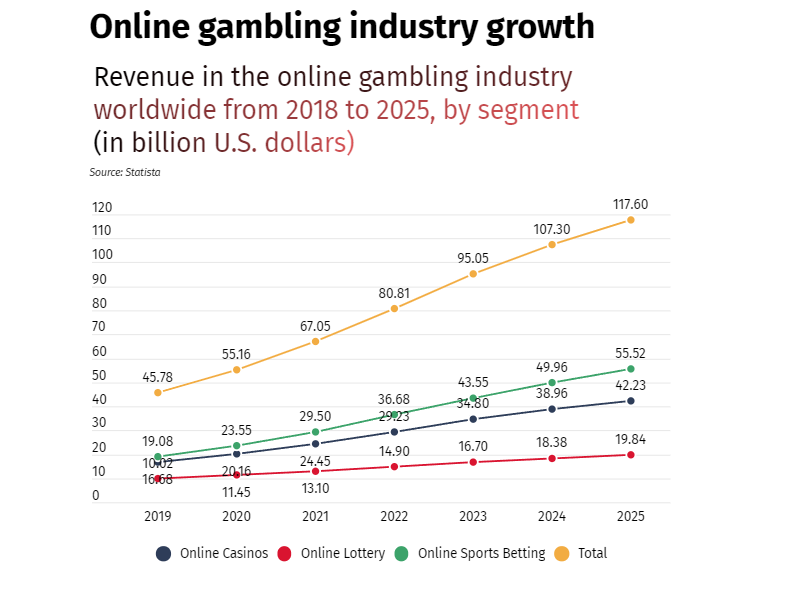The Super Bowl Illustrates the Need for Seamless & Secure Identity Verification in Online Gaming


Consumers' appetite for the convenience and accessibility of online services is perfectly illustrated by the incredible growth of the online gaming market in recent years, which is expected to reach almost $120 billion by 2025. However, as technology advances, so too do the tactics of those seeking to exploit online gaming tools and services. The sophistication of fraudsters has reached unprecedented levels, posing a significant challenge to the online gaming industry.

While the popularity of online gaming has caught fire, it has also opened up new channels for fraud. According to the FBI, more than $10.2 billion of wagered money was lost in 2022 in the U.S. due to fraud. This figure represents a nearly 50% increase in losses incurred in the preceding year, which amounted to $6.9 billion. Of particular note is that 21% of the reported cases were attributed to identity fraud, resulting in losses surpassing $2.1 billion.
How to Hold the Defensive Line Against Fraudsters
According to the American Gaming Association, 26% of the U.S. adult population (almost 68 million individuals) are projected to wager money on Super Bowl LVIII, which is a 35% increase from 2023. It’s estimated that there will be more than $23 billion bet on this year’s game, up from $16 billion last year.
With the big game just around the corner, it’s a good time to consider the imperative need for robust identity verification in the customer onboarding process for gaming tools and services. As the stakes rise and the online gaming market continues to grow, ensuring rigorous user identity verification should be a top priority as an effort for gaming companies to reduce fraud.
As consumers take more of their business and entertainment online, they have come to expect a speedy and efficient process for registering. They want to get access as fast as possible to begin participating in the experience. For gaming companies trying to attract new users to their platforms, every moment and interaction is significant. As a starting point, companies must safeguard their "front door" from potential threats such as account opening fraud, the use of stolen or synthetic credentials, promotion abuse via the creation of multiple accounts, and a variety of other tactics used by fraudsters. Ultimately, those companies adept at harmonizing speed with security will gain a competitive advantage in this hypergrowth market.
Stopping Fraud at the Front Door
The key to both acquiring customers and eliminating fraud from entering the environment of an online gaming service is the front door. It’s here that the initial encounter occurs, and the customer journey begins. However, this gateway does not operate like an actual door. The potential of account opening fraud is a constant threat, yet using step-up methods to validate users can add friction to the process and therefore create customer drop-off. Striking the delicate balance between seamless onboarding and robust identity verification measures is a significant challenge faced by online gaming organizations.
One of the most effective ways of balancing these needs is with the use of Prove’s auto-fill technology, which enables applicants to populate forms by consenting to auto-filling registration fields with their own information. It accelerates onboarding while also mitigating account opening fraud by auto-populating registration fields with information from authoritative sources (with explicit consent from the consumer filling out the form). By auto-filling registration forms and making the onboarding process up to 79% faster, Prove helps companies reduce abandonment while also weeding out fraudsters.
Let’s explore in more detail the intricacies of auto-fill technology and its application in online sports betting and gaming. These insights not only enhance user experiences but also fortify their "front door" against potential threats.
The Need for Speed
Despite allocating substantial marketing dollars to attract new players through brand campaigns and performance marketing, a significant number of potential customers abandon the sign-up process. Notably, digital sports betting and gaming exhibit one of the highest drop-off rates in the registration flow across industries, even with enticing new-player bonuses and easy-to-use customer experiences.
This trend, observed in mature online gaming markets like the U.K., is, unfortunately, replicating itself in the U.S., where product teams of gaming companies employ similar and highly effective registration techniques. Yet, irrespective of how many new users are tempted to register for services, the only way to convert prospects into actual users is by getting them efficiently through the registration process. One of the culprits behind these high drop-off rates is prolonged and cumbersome onboarding flows that demand an excessive amount of time from users. Fortunately, the auto-fill approach expedites the onboarding process and mitigates abandonment.
In digital gaming, instant access is essential. It may be one of the most important, foundational pieces of effective customer acquisition, as organizational growth and the delivery of essential services depend on the rapid granting of access to verified customers.
However, this process is hindered when flawed identity decisions lead to fraud, bias, and adverse economic outcomes. A better approach involves implementing identity verification that paves the way for the verification of legitimate identities on the internet while concurrently eradicating fraud.
The Prove Pre-Fill® digital identity solution utilizes phone-centric identity verification and cryptographic authentication to automatically populate forms with verified information about a user. This innovative approach streamlines the registration process for the majority of legitimate gaming customers. Proven through rigorous vetting, this solution has already demonstrated tangible results, including a notable 35% reduction in onboarding abandonment. Its success extends across some of the most regulated industries, including the largest banks, insurance companies, healthcare organizations, and fintechs in the United States.
The Need for Identity Accuracy
Beyond the role of expediting onboarding processes, user authentication is critical for preventing promotion abuse and various forms of fraud in the digital gaming market. The Prove Pre-Fill® solution employs a distinctive "PRO" methodology, comprised of three key factors:
- Possession: This factor addresses the fundamental question: Does the customer possess the phone (and, crucially, the associated phone number)? Confirming that a customer has the phone in their possession during a transaction helps ensure the actual customer is engaged in the interaction, regardless of the channel. This verification process is pivotal in guarding against various forms of identity fraud.
- Reputation: This factor tackles the query: Are there notable changes or suspicious activities linked to the phone number? Phone numbers serve as potent identification tools, with near real-time assessments of attributes, including activities that may indicate heightened risk. Actions such as using a burner phone, undergoing a SIM swap, obtaining a new phone number, or using a VoIP line all fall on different risk spectrums. By evaluating these actions, companies can flag the phone or phone number for potential risk.
- Ownership: This factor addresses the question of who the phone number belongs to. It is imperative to accurately associate the phone number with the correct individual to avoid identity verification errors that could lead to account takeover or duplicate account sign-ups. Prove tracks ownership changes in near real-time.
Data auto-filling occurs only when all three factors are validated, effectively thwarting fraudsters from utilizing stolen identity information for creating accounts. This phone-centric approach is adept at identifying attempted duplicate account sign-ups, a prevalent occurrence, particularly given the alluring bonuses offered by sports betting and gaming operators in their race to attract new players.
The Onboarding Ideal: More, Happy, and Validated Users
In digital gaming, immediate access to services and products is critical for companies to achieve ambitious revenue targets and establish brand leadership. Economic growth and the delivery of services rely on providing access to "good" customers swiftly and efficiently while preventing access to “bad customers” (i.e., fraudsters). With the Prove Pre-Fill® solution, consumers have less work to do, and they experience practically zero friction. Enterprises use the Prove Pre-Fill® solution to support ambitious customer growth targets while being able to rely on sophisticated decisioning to reduce fraud.
Want to accelerate onboarding, acquire new users quickly, reduce abandonment rates, and prevent fraud? Speak with a digital identity solutions expert today.
RELATED: Prove Enables Seamless and Secure Gaming Experiences to FanDuel Customers

Keep reading
 Read the article: The Death of the OTP: Why Legacy MFA is Failing the Modern Consumer
Read the article: The Death of the OTP: Why Legacy MFA is Failing the Modern ConsumerDiscover why legacy MFA is failing and how Prove Unified Authentication provides a smarter, frictionless alternative. Learn how to replace insecure SMS OTPs with continuous, multi-layered identity assurance that prevents fraud while boosting conversion rates.
 Read the article: Prove Launches ProveX℠, the Internet’s First Digital Trust Exchange
Read the article: Prove Launches ProveX℠, the Internet’s First Digital Trust ExchangeProve launches ProveX, ProveX, a new digital trust exchange that enables enterprises to instantly access verified data and credentials from partners, while preserving trust through every interaction
 Read the article: Beyond the OTP: Why SMS-Based 2FA Is Failing and What Comes Next
Read the article: Beyond the OTP: Why SMS-Based 2FA Is Failing and What Comes NextExplore the classic conflict between security measures and user friction.












